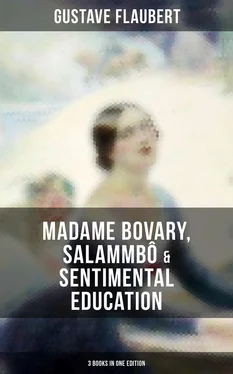Gustave Flaubert
Gustave Flaubert: Madame Bovary, Salammbô & Sentimental Education
(3 Books in One Edition)
Published by
 Books
Books
Advanced Digital Solutions & High-Quality eBook Formatting
musaicumbooks@okpublishing.info2017 OK Publishing ISBN 978-80-272-3362-5
Madame Bovary Madame Bovary Table of Contents
Part I
Chapter One
Chapter Two
Chapter Three
Chapter Four
Chapter Five
Chapter Six
Chapter Seven
Chapter Eight
Chapter Nine
Part II
Chapter One
Chapter Two
Chapter Three
Chapter Four
Chapter Five
Chapter Six
Chapter Seven
Chapter Eight
Chapter Nine
Chapter Ten
Chapter Eleven
Chapter Twelve
Chapter Thirteen
Chapter Fourteen
Chapter Fifteen
Part III
Chapter One
Chapter Two
Chapter Three
Chapter Four
Chapter Five
Chapter Six
Chapter Seven
Chapter Eight
Chapter Nine
Chapter Ten
Chapter Eleven
Salammbô
Chapter I The Feast
Chapter II At Sicca
Chapter III Salammbo
Chapter IV Beneath the Walls of Carthage
Chapter V Tanith
Chapter VI Hanno
Chapter VII Hamilcar Barca
Chapter VIII The Battle of the Macaras
Chapter IX In the Field
Chapter X The Serpent
Chapter XI In the Tent
Chapter XII The Aqueduct
Chapter XIII Moloch
Chapter XIV The Pass of the Hatchet
Chapter XV Matho
Sentimental Education
Chapter I A Promising Pupil
Chapter II Damon And Pythias
Chapter III. Sentiment And Passion
Chapter IV The Inexpressible She!
Chapter V "Love Knoweth No Laws"
Chapter VI Blighted Hopes
Chapter VII Change Of Fortune
Chapter VIII Frederick Entertains
Chapter IX The Friend Of The Family
Chapter X At The Races
Chapter XI A Dinner and a Duel.
Chapter XII Little Louise Grows Up.
Chapter XIII Rosanette as a Lovely Turk.
Chapter XIV The Barricade.
Chapter XV "How Happy Could I Be With Either."
Chapter XVI Unpleasant News from Rosanette.
Chapter XVII A Strange Betrothal.
Chapter XVIII An Auction.
Chapter XIX A Bitter-Sweet Reunion.
Chapter XX "Wait Till You Come to Forty Year."
Footnotes
Table of Contents
To Marie-Antoine-Jules Senard
Member of the Paris Bar, Ex-President of the National Assembly, and Former Minister of the Interior
Dear and Illustrious Friend,
Permit me to inscribe your name at the head of this book, and above its dedication; for it is to you, before all, that I owe its publication. Reading over your magnificent defence, my work has acquired for myself, as it were, an unexpected authority.
Accept, then, here, the homage of my gratitude, which, how great soever it is, will never attain the height of your eloquence and your devotion.
Gustave Flaubert
Paris, 12 April 1857
Table of Contents
We were in class when the head-master came in, followed by a “new fellow,” not wearing the school uniform, and a school servant carrying a large desk. Those who had been asleep woke up, and every one rose as if just surprised at his work.
The head-master made a sign to us to sit down. Then, turning to the class-master, he said to him in a low voice —
“Monsieur Roger, here is a pupil whom I recommend to your care; he’ll be in the second. If his work and conduct are satisfactory, he will go into one of the upper classes, as becomes his age.”
The “new fellow,” standing in the corner behind the door so that he could hardly be seen, was a country lad of about fifteen, and taller than any of us. His hair was cut square on his forehead like a village chorister’s; he looked reliable, but very ill at ease. Although he was not broad-shouldered, his short school jacket of green cloth with black buttons must have been tight about the arm-holes, and showed at the opening of the cuffs red wrists accustomed to being bare. His legs, in blue stockings, looked out from beneath yellow trousers, drawn tight by braces, He wore stout, ill-cleaned, hob-nailed boots.
We began repeating the lesson. He listened with all his ears, as attentive as if at a sermon, not daring even to cross his legs or lean on his elbow; and when at two o’clock the bell rang, the master was obliged to tell him to fall into line with the rest of us.
When we came back to work, we were in the habit of throwing our caps on the ground so as to have our hands more free; we used from the door to toss them under the form, so that they hit against the wall and made a lot of dust: it was “the thing.”
But, whether he had not noticed the trick, or did not dare to attempt it, the “new fellow,” was still holding his cap on his knees even after prayers were over. It was one of those head-gears of composite order, in which we can find traces of the bearskin, shako, billycock hat, sealskin cap, and cotton night-cap; one of those poor things, in fine, whose dumb ugliness has depths of expression, like an imbecile’s face. Oval, stiffened with whalebone, it began with three round knobs; then came in succession lozenges of velvet and rabbit-skin separated by a red band; after that a sort of bag that ended in a cardboard polygon covered with complicated braiding, from which hung, at the end of a long thin cord, small twisted gold threads in the manner of a tassel. The cap was new; its peak shone.
“Rise,” said the master.
He stood up; his cap fell. The whole class began to laugh. He stooped to pick it up. A neighbor knocked it down again with his elbow; he picked it up once more.
“Get rid of your helmet,” said the master, who was a bit of a wag.
There was a burst of laughter from the boys, which so thoroughly put the poor lad out of countenance that he did not know whether to keep his cap in his hand, leave it on the ground, or put it on his head. He sat down again and placed it on his knee.
“Rise,” repeated the master, “and tell me your name.”
The new boy articulated in a stammering voice an unintelligible name.
“Again!”
Читать дальше

 Books
Books










